Find Help
More Items From Ergsy search
-

Post-traumatic stress disorder (PTSD) - Introduction
Relevance: 100%
-

Post-traumatic stress disorder (PTSD) - Self-help guide
Relevance: 91%
-
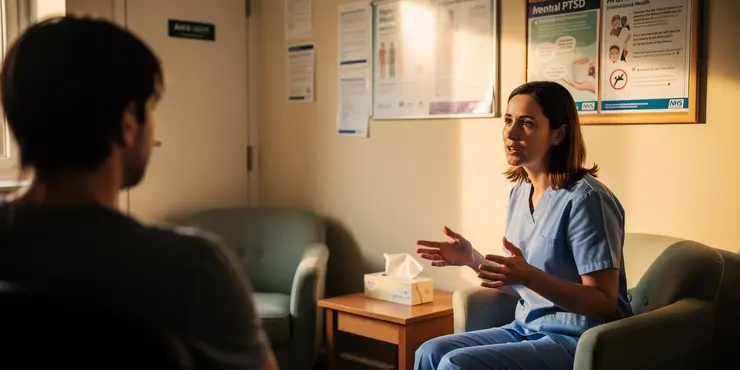
Understanding and Managing PTSD powerpoint slides with audio
Relevance: 49%
-

Short Films About Mental Health - Trauma PTSD
Relevance: 48%
-
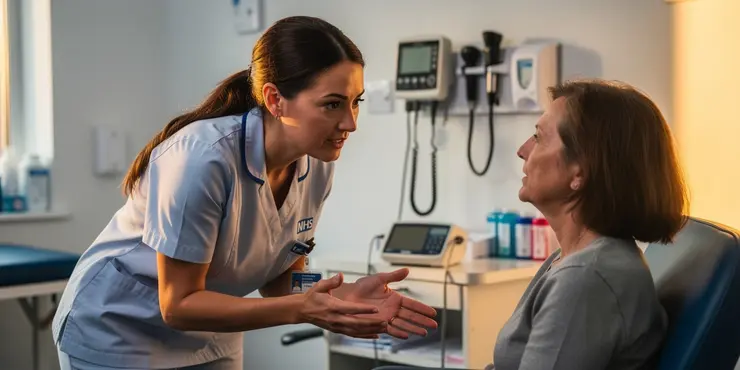
Can stress trigger shingles?
Relevance: 30%
-
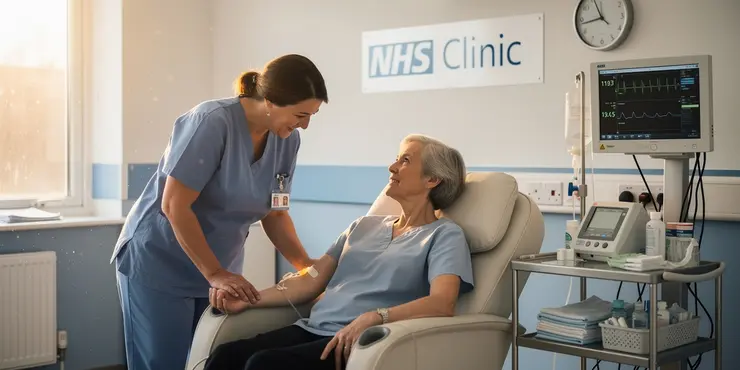
What conditions is ketamine used to treat?
Relevance: 29%
-
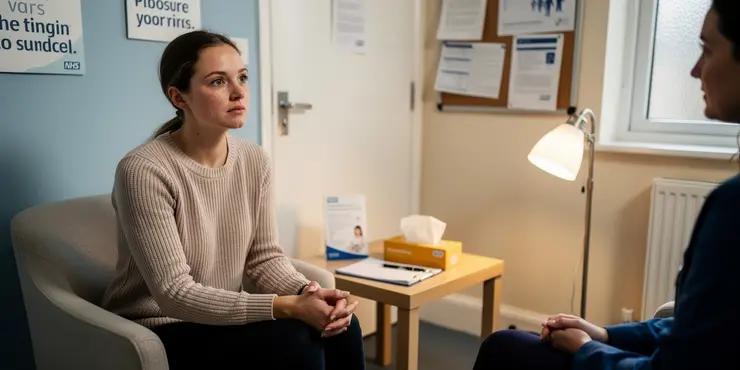
How do eating disorders affect mental health?
Relevance: 29%
-
Can eating disorders occur with other mental health conditions?
Relevance: 28%
-
Does stress affect tinnitus?
Relevance: 28%
-

BSL - Causes of panic disorder
Relevance: 27%
-

Living with Bipolar Disorder
Relevance: 25%
-

What type of anxiety do children and teenagers experience?
Relevance: 25%
-
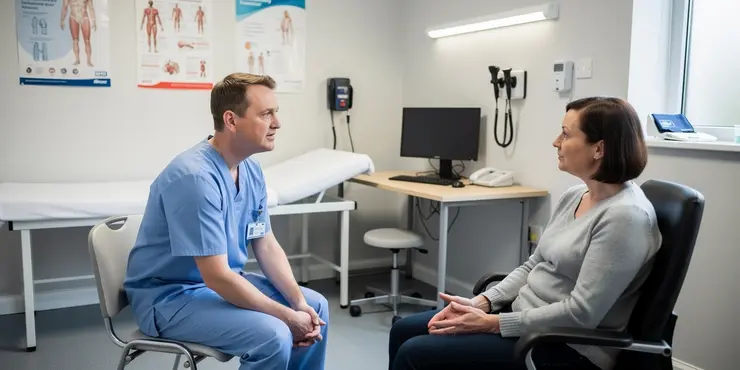
BSL - Introduction to panic disorder
Relevance: 25%
-

Coping with Stress and Anxiety
Relevance: 25%
-
What is an Eating Disorder?
Relevance: 24%
-
Are there preventative measures for eating disorders?
Relevance: 23%
-
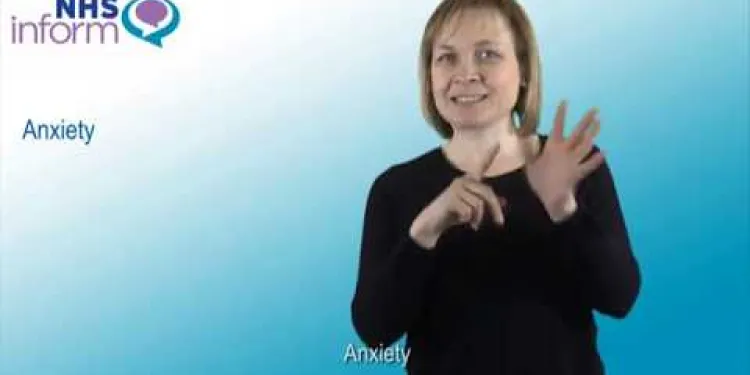
Generalised anxiety disorder (GAD)
Relevance: 23%
-
Is it possible to recover from an eating disorder?
Relevance: 23%
-
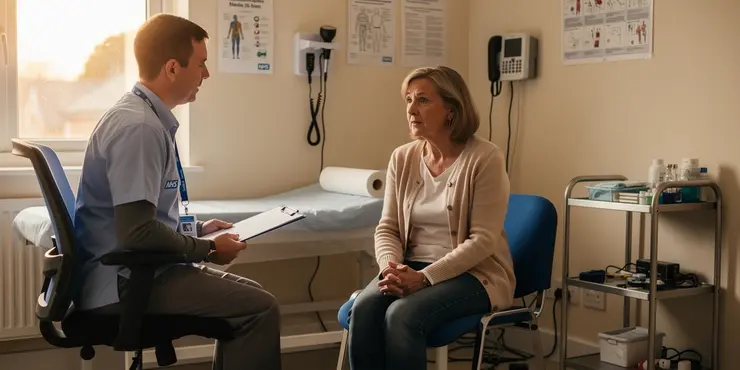
Does stress contribute to nettle rash?
Relevance: 23%
-
Are eating disorders only about food?
Relevance: 23%
-
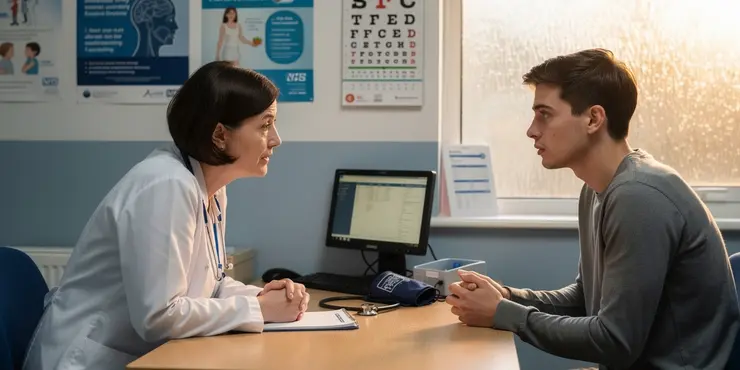
BSL - Diagnosis of panic disorder
Relevance: 23%
-
What is the role of therapy in treating eating disorders?
Relevance: 23%
-
What is an eating disorder?
Relevance: 23%
-

Eating disorders: treatment
Relevance: 22%
-
Who is at risk for developing an eating disorder?
Relevance: 22%
-

BSL - Treatment of panic disorder
Relevance: 22%
-
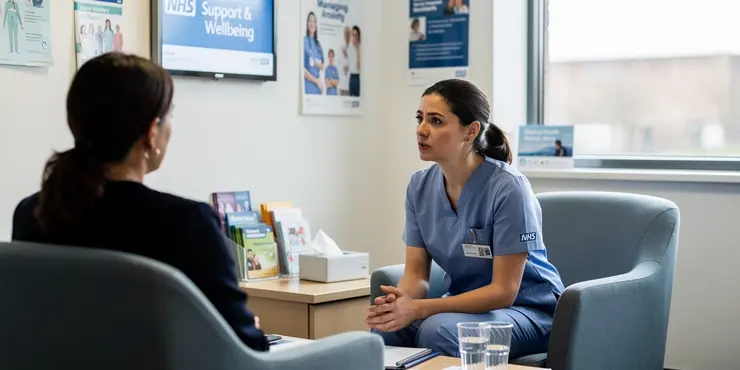
BSL - Symptoms of panic disorder
Relevance: 22%
-
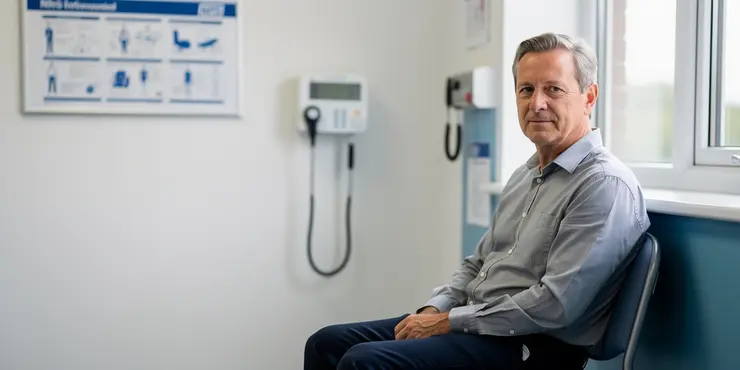
Bipolar disorder: Rod's story | NHS
Relevance: 21%
-
How are eating disorders diagnosed?
Relevance: 21%
-
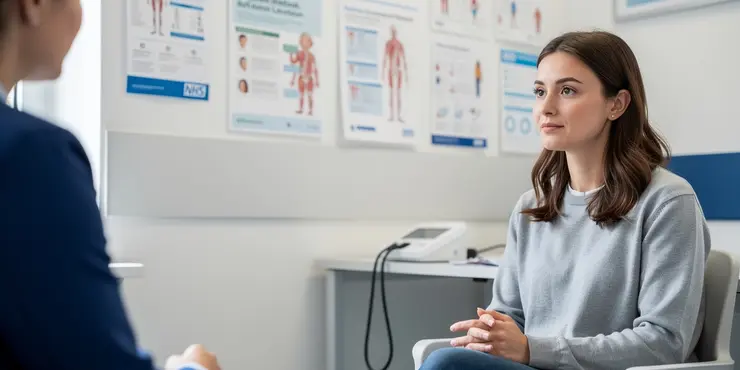
The treatment approach for an eating disorder
Relevance: 21%
-
What are the main types of eating disorders?
Relevance: 21%
-
Can eating disorders be treated?
Relevance: 21%
-

BSL - Panic disorder: things you can do to help yourself
Relevance: 21%
-
What are common symptoms of eating disorders?
Relevance: 21%
-
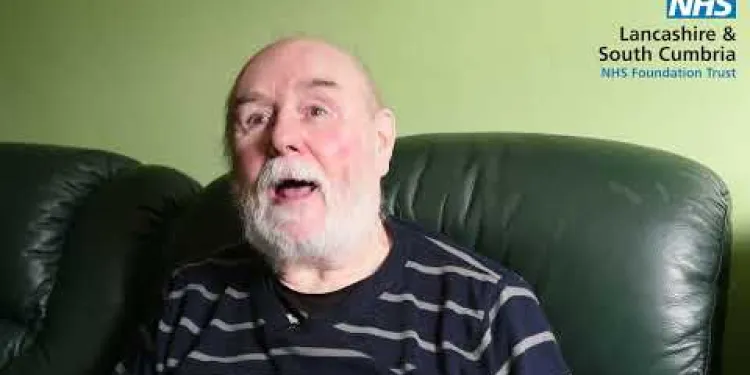
Steve Green tells his story on living with a hoarding disorder
Relevance: 21%
-

Does stress impact gut health as we age?
Relevance: 21%
-
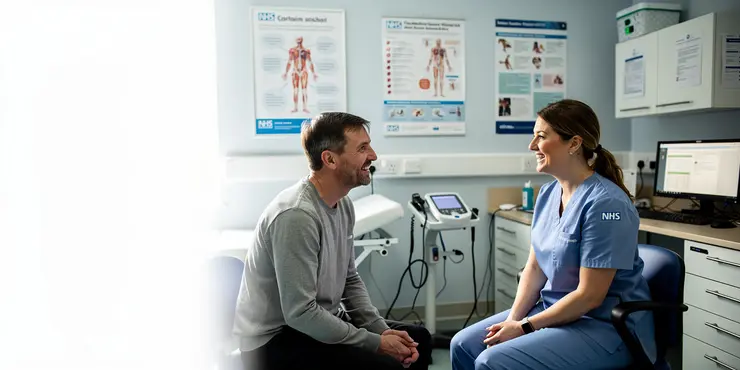
Can stress trigger shingles?
Relevance: 21%
-
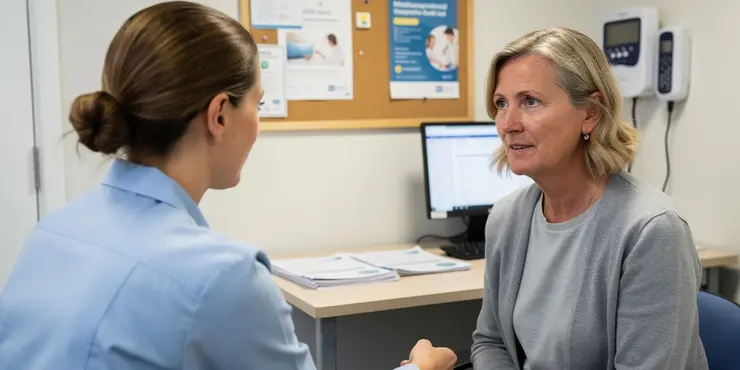
What is seasonal affective disorder - or SAD?
Relevance: 21%
-
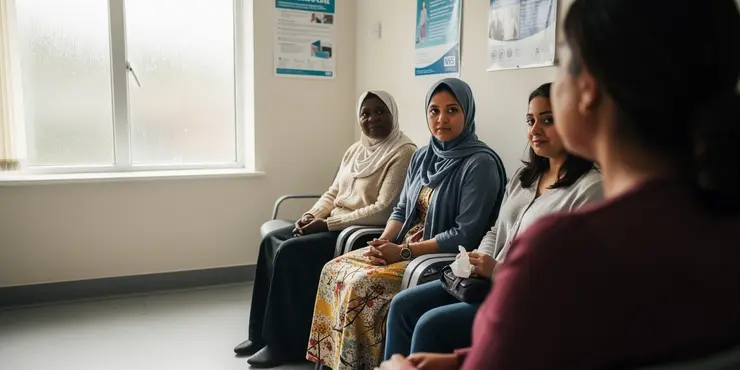
Women talking about their personal experiences of female genital mutilation (FGM) | NHS
Relevance: 20%
-
What are the long-term effects of untreated eating disorders?
Relevance: 20%
Understanding Post-Traumatic Stress Disorder (PTSD)
Introduction to PTSD
Post-traumatic stress disorder (PTSD) is a mental health condition triggered by experiencing or witnessing a terrifying event. It can affect anyone, with varying degrees of severity, and manifests in a variety of ways. Symptoms can include flashbacks, nightmares, severe anxiety, and uncontrollable thoughts about the event. In the United Kingdom, it is estimated that 4 in every 100 people will develop PTSD at some point in their lives.
Causes of PTSD
PTSD can be caused by any event that causes intense fear, helplessness, or horror. Common triggers include military combat, serious accidents, natural disasters, terrorist attacks, sexual or physical assault, and abusive relationships. Individually, factors like personal history, the nature of the traumatic event, and the person's coping mechanisms play a significant role in the development of PTSD.
Symptoms of PTSD
The symptoms of PTSD are generally categorized into four groups: intrusive memories, avoidance, negative changes in thinking and mood, and changes in physical and emotional reactions. Intrusive memories can involve recurrent, unwanted distressing memories of the traumatic event or severe emotional distress at reminders of the experience. Avoidance may include avoiding places, activities, or people that remind one of the trauma. There may also be feelings of hopelessness, emotional numbness, and difficulty maintaining close relationships. Finally, sufferers may experience hyperarousal symptoms like being easily startled, feeling tense, having difficulty sleeping, and experiencing angry outbursts.
Treatment and Support in the UK
Treatment for PTSD often involves psychotherapy, medication, or a combination of both. In the UK, the NHS provides access to mental health services, including cognitive behavioural therapy (CBT) and eye movement desensitisation and reprocessing therapy (EMDR). Antidepressants such as selective serotonin reuptake inhibitors (SSRIs) are also commonly prescribed. Support groups and charities, like PTSD UK, offer additional resources and support to help individuals manage their symptoms and recover from their trauma.
Living with PTSD
Living with PTSD can be challenging, but with the right treatment, support, and self-care strategies, individuals can lead fulfilling lives. It is crucial for those affected to reach out for help and take steps to create a supportive and understanding environment. Early intervention and appropriate treatment are key in managing the condition and improving the quality of life for sufferers in the UK.
Understanding Post-Traumatic Stress Disorder (PTSD)
Post-Traumatic Stress Disorder (PTSD) is a mental health condition triggered by experiencing or witnessing a traumatic event. Whether it's combat exposure, a serious accident, natural disaster, or personal assault, the impact of such trauma can be profound. In the United Kingdom, PTSD affects not only veterans but civilians who have faced distressing situations.
Symptoms of PTSD
PTSD symptoms can be overwhelming and are typically categorised into four types: intrusive memories, avoidance, negative changes in thinking and mood, and changes in physical and emotional reactions. Intrusive memories may include flashbacks and distressing dreams, while avoidance could mean evading places or activities that are reminders of the trauma. Individuals might also experience a sense of detachment, hopelessness, or emotional numbness.
Causes and Risk Factors
The main cause of PTSD is undergoing a traumatic experience, but not everyone exposed to trauma develops PTSD. Risk factors include having existing mental health issues, lacking support systems, having experienced intense trauma, or having faced repeated stressors. Genetics and neurobiological factors can also play a part in one's vulnerability to developing PTSD.
Treatment Options Available in the UK
Treatment for PTSD can vary, but it often includes psychotherapy such as Cognitive Behavioral Therapy (CBT), which is readily available through the NHS in the UK. Eye Movement Desensitisation and Reprocessing (EMDR) is another effective treatment that NHS offers. Medications like SSRIs may also be prescribed to manage symptoms. Importantly, access to mental health services varies across regions, and initiatives continue to improve support systems throughout the UK.
Support and Resources
In the UK, organisations such as Combat Stress and PTSD UK provide resources and support for individuals and their families dealing with PTSD. The National Health Service (NHS) offers various treatment programmes, and mental health helplines are available for immediate assistance. Raising public awareness is crucial to ensure those affected know where to seek help and to reduce stigma surrounding mental health issues.
Understanding Post-Traumatic Stress Disorder (PTSD)
Introduction to PTSD
PTSD is a problem you can have after something very scary happens to you. It can make you feel very upset for a long time. Different people can have different symptoms. Some people have bad dreams or feel very worried. In the UK, about 4 out of 100 people will get PTSD at some time in their life.
Causes of PTSD
PTSD can happen after a really frightening event. Some common examples are fighting in a war, car accidents, storms, attacks, or when someone hurts you on purpose. Each person is different, and their history or how they deal with stress can make a difference in getting PTSD.
Symptoms of PTSD
People with PTSD might have problems in four main areas: memories that won't go away, staying away from reminders, feeling bad or sad, and being jumpy. Memories might come back suddenly, or you might feel very upset when you remember. You might avoid places or people that remind you of the scary event. Some people feel empty or find it hard to be happy. You might also feel very on edge and have angry outbursts, or find it hard to sleep.
Treatment and Support in the UK
Treatment for PTSD usually includes talking to a therapist, taking medicine, or both. In the UK, the NHS can help you get therapy, like CBT, and other treatments like EMDR. Doctors might also give you medicine to help you feel better. Support groups and charities, like PTSD UK, are there to help too.
Living with PTSD
Living with PTSD can be hard, but with the right help, people can feel better. It is important to reach out and ask for help. Having a caring and friendly environment makes a big difference. Getting help early can really help people manage PTSD and improve their lives in the UK.
Understanding Post-Traumatic Stress Disorder (PTSD)
Post-Traumatic Stress Disorder, or PTSD, happens when bad events make people feel very upset. This can be from things like fighting in a war, a bad car crash, a big storm, or getting hurt by someone. PTSD can happen to soldiers and also to people who experience scary situations.
Symptoms of PTSD
PTSD signs can be very strong. There are four main types: remembering the bad events when you don’t want to, staying away from things that remind you of the bad events, feeling bad or sad, and reacting differently to things. You might have bad dreams or remember the bad things suddenly. You may also try to not go to places that make you think of the bad times. Some people feel alone, sad, or numb inside.
Causes and Risk Factors
PTSD comes from going through scary things, but not everyone gets PTSD from bad events. It is more likely if you already have other mental health problems, don’t have people to help you, or have been through really bad or lots of bad things. Family history and how your brain works can also make PTSD more likely.
Treatment Options Available in the UK
There are different ways to help people with PTSD. Talking therapy like Cognitive Behavioral Therapy (CBT) is very common and you can get it through the NHS in the UK. There is also a treatment called Eye Movement Desensitisation and Reprocessing (EMDR) that helps many people. Doctors might give medication to help with the symptoms. Not all places in the UK have the same level of help, but efforts are being made to improve this.
Support and Resources
In the UK, groups like Combat Stress and PTSD UK help people with PTSD and their families. The National Health Service (NHS) has programs to help, and there are helplines for when you need help quickly. Telling people about PTSD and what help is available is important. It helps people know where to get help and makes talking about mental health less scary.
Frequently Asked Questions
What is Post-traumatic Stress Disorder (PTSD)?
PTSD is a mental health condition that's triggered by experiencing or witnessing a traumatic event. It can cause significant distress and interfere with daily life.
What are the common symptoms of PTSD?
Common symptoms of PTSD include flashbacks, nightmares, severe anxiety, and uncontrollable thoughts about the traumatic event.
How is PTSD diagnosed?
PTSD is diagnosed by a mental health professional through a comprehensive assessment, often using criteria from diagnostic manuals such as the DSM-5.
Who is at risk of developing PTSD?
Anyone who experiences a traumatic event can develop PTSD, but risk factors include having a history of previous trauma, a lack of support after the event, or a history of mental illness.
Is PTSD treatable?
Yes, PTSD is treatable. Treatment options include psychotherapy, medication, or a combination of both.
What types of therapy are effective for treating PTSD?
Effective therapies for PTSD include cognitive behavioural therapy (CBT), eye movement desensitization and reprocessing (EMDR), and exposure therapy.
Can medication help in treating PTSD?
Yes, certain medications, such as selective serotonin reuptake inhibitors (SSRIs), can be effective in reducing PTSD symptoms.
How can I support someone with PTSD?
Supporting someone with PTSD involves being patient, listening without judgment, encouraging them to seek professional help, and educating yourself about the disorder.
Is PTSD only caused by military combat?
No, while combat-related trauma is a cause, PTSD can result from any traumatic event, such as accidents, natural disasters, assaults, or witnessing violence.
How long does PTSD last?
The duration of PTSD varies; some may recover in a few months, while others may experience symptoms for much longer, especially if not treated.
What should I do if I think I have PTSD?
If you think you have PTSD, it's important to seek help from a mental health professional for a proper assessment and treatment plan.
Are children and teenagers affected by PTSD?
Yes, children and teenagers can develop PTSD, and their symptoms may differ from adults, often involving regression in behaviour or developmental issues.
Can PTSD go away on its own?
While some people may recover from PTSD without treatment, professional help can significantly improve recovery and manage symptoms effectively.
What is the impact of PTSD on daily life?
PTSD can impact daily life by causing difficulties in maintaining relationships, trouble at work or school, and issues coping with day-to-day activities.
Are there any self-help strategies for managing PTSD symptoms?
Yes, self-help strategies may include mindfulness practices, regular exercise, maintaining a support network, and keeping a journal of thoughts and feelings.
What is PTSD?
PTSD stands for Post-traumatic Stress Disorder. It happens after a scary or bad event. It can make someone feel upset for a long time.
This means they might have bad dreams, feel scared, or think about the event a lot.
If you feel this way, talk to someone who can help, like a doctor or a counselor.
Using calming activities, like drawing or listening to music, can help feel better.
PTSD is a problem with how we feel and think. It happens after a scary or bad thing happens to us or we see it happen to someone else. PTSD can make us feel very upset and can make it hard to do things every day.
Here are some things that can help:
- Talk to someone you trust, like a friend or a family member.
- Write down how you feel in a journal.
- Try deep breathing or listening to calming music to relax.
- If it feels too hard to handle, ask a doctor or counselor for help.
What are the common signs of PTSD?
PTSD means feeling very scared or upset after something bad has happened.
Here are some signs you might notice:
- Having bad dreams or memories about it a lot.
- Trying not to think or talk about what happened.
- Feeling jumpy, worried, or angry all the time.
- Finding it hard to sleep or concentrate.
If these signs don't go away, talking to someone who can help, like a doctor or counselor, is a good idea.
People with PTSD might have some common signs. These signs can be things like:
- Remembering the bad event like it's happening again (flashbacks).
- Scary dreams about what happened (nightmares).
- Feeling really worried and scared (severe anxiety).
- Thinking about the bad event all the time and not being able to stop (uncontrollable thoughts).
Here are some tools or techniques that might help:
- Talking to someone you trust about your feelings.
- Trying deep breathing or calming exercises.
- Writing in a journal to let out your thoughts.
How do doctors know if someone has PTSD?
A doctor or therapist can find out if someone has PTSD. They ask lots of questions. They use a big book called the DSM-5 to help them understand.
Who can get PTSD?
Anyone can get PTSD if they go through something really scary or bad. Some things make it more likely, like if you have had other scary times before, if you don't have people to talk to after it happens, or if you have been sick in the mind before.
Can you make PTSD go away?
Yes, PTSD can get better with help. There are things like talking to a helper (a therapist) or taking medicine that can make you feel better. Some people find drawing or talking with friends also helps them. It's important to ask for help if you feel sad or scared.
Talking to someone you trust, writing in a journal, or using apps that relax you might also be helpful tools.
Yes, PTSD can be treated. There are different ways to help, like talking therapy, medicine, or using both together.
What kinds of therapy can help with PTSD?
PTSD stands for post-traumatic stress disorder. It happens after scary or bad events. Here are some therapies that can help:
- Talking Therapy: You talk to a therapist about your feelings and thoughts.
- CBT (Cognitive Behavioral Therapy): A therapist helps you change bad thoughts into good thoughts.
- EMDR (Eye Movement Desensitization and Reprocessing): You think about the event while moving your eyes in a special way.
If you find reading hard, you can:
- Ask someone to read to you.
- Use audiobooks or videos.
- Break information into smaller parts.
These treatments can help with PTSD:
- Talking Therapy (CBT): You talk to a therapist about your feelings and thoughts. They can help you feel better.
- Eye Movement Therapy (EMDR): You think about your memories while moving your eyes. This can make you feel less upset.
- Exposure Therapy: You learn to face your fears in a safe way. It can help make those fears go away.
Can Medicine Help with PTSD?
PTSD makes people feel really upset after bad things happen. Medicine can help people feel better. It can make them feel less scared and worried. Medicine is not the only way to help. Talking to a doctor or therapist is important too.
Here are some tools that can help:
- Medicines: These are special pills that can help calm your feelings.
- Therapy: Talking to someone who is trained to help. They can teach you ways to feel better.
- Support Groups: Meeting other people who feel the same way. It's good to know you are not alone.
Always talk to a doctor before taking any medicine.
Yes, some medicines can help lower PTSD symptoms. These medicines are called selective serotonin reuptake inhibitors, or SSRIs.
How can I help someone with PTSD?
Here is how you can help someone with PTSD (Post-Traumatic Stress Disorder):
- Listen carefully: Be a good friend and listen to them when they want to talk.
- Be patient: Healing takes time, so be patient and kind.
- Encourage them: Suggest seeing a doctor or therapist who can help.
- Learn more: Read about PTSD so you understand it better.
- Do activities together: Find fun activities to do together, like walking or drawing.
There are tools to help you:
- Use relaxation apps: They can help them feel calm.
- Join support groups: Meet others who also want to help adults and kids with PTSD.
Helping someone with PTSD means being patient, listening kindly, and suggesting they talk to a doctor. It's good to learn about PTSD too.
Can only soldiers get PTSD?
No, PTSD does not only happen because of fighting in wars. It can come from any scary or bad event. This could be things like car crashes, big storms, being hurt by someone, or seeing something violent happen.
To make reading easier, try using tools like audiobooks or text-to-speech apps where the app reads the words out loud. You could also get help from a teacher, friend, or family member to read along with you.
How long does PTSD last?
PTSD means "Post-Traumatic Stress Disorder". It is when someone feels scared or upset after a very bad event.
PTSD can last for weeks, months, or even years. It is different for each person.
Talking to a doctor or therapist can help. They can give you tools and techniques to feel better.
It is important to get help if you feel this way.
How long PTSD lasts can be different for each person. Some people feel better in a few months. Others might have PTSD for a long time if they don't get help.
What can I do if I think I have PTSD?
PTSD means you feel very scared or upset about something that happened in the past.
Here are some steps you can take:
- Talk to Someone: Tell a friend or family member how you feel. They can support you.
- Visit a Doctor: A doctor can help you understand your feelings and suggest ways to feel better.
- Write it Down: Keeping a diary can help you understand your thoughts.
- Do Relaxing Activities: Try drawing, listening to music, or going for a walk.
If you need help, you are not alone. It's brave to ask for support.
If you think you have PTSD, it is important to get help. You should talk to a doctor who knows about mental health. They can check how you are feeling and help you feel better.
Can kids and teens get PTSD?
Yes, kids and teenagers can get PTSD. This is when scary things happen and make you feel upset for a long time. Kids with PTSD might act like they are younger or have trouble growing up. If someone has PTSD, talking to a trusted adult and seeing a doctor or therapist can help.
Can PTSD get better by itself?
PTSD stands for Post-Traumatic Stress Disorder. It is when you feel very upset because of bad things that happened. Sometimes, PTSD can get better over time, but not always.
If you have PTSD, here are some things that might help:
- Talking to someone you trust about how you feel.
- Seeing a doctor or a therapist who knows about PTSD.
- Learning ways to relax and feel calm.
- Writing down your thoughts and feelings in a journal.
It’s always good to ask for help if you need it.
Some people might get better from PTSD by themselves. But seeing a doctor or therapist can help a lot. It can make getting better easier and help with the hard parts.
How does PTSD affect daily life?
PTSD stands for Post-Traumatic Stress Disorder. This is a condition that some people get after seeing or going through scary events.
PTSD can make people feel very upset. It can change the way they feel, think, and act every day.
Here is how PTSD might affect someone:
- Feeling Scared: People might feel very scared or worried, even when they are safe.
- Bad Memories: They might have strong memories of the scary event that come back again and again.
- Nightmares: They might have bad dreams about the scary event.
- Feeling Mad or Sad: PTSD can make people feel angry, sad, or nervous a lot.
- Staying Away: They may avoid places or people that remind them of the scary event.
Here are some things that can help:
- Talk to Someone: Talking to a doctor or a therapist can help a lot.
- Relaxing Exercises: Things like deep breathing or listening to calm music can help people feel better.
- Support Groups: Meeting other people with PTSD can make them feel less alone.
It’s important to know that help is available, and people can feel better over time with treatment.
PTSD can make everyday life hard. It can be tough to keep friendships and relationships. It can also cause problems at work or school. Dealing with daily things might be difficult too.
Using tools can help. Here are some ideas:
- Talk to someone you trust about how you feel.
- Try writing down your thoughts in a journal.
- Practice deep breathing or calming exercises.
- Ask a teacher or boss for help if you need it at school or work.
How can I help myself feel better if I have PTSD?
If you have PTSD, there are ways to help yourself feel better. You can try some of these ideas:
- Talk to a friend or someone you trust about how you feel.
- Try to go for a short walk or do a little bit of exercise every day.
- Write down your thoughts in a notebook or diary.
- Breathe slowly and deeply to help you relax.
- Listen to calm music or do something else that makes you happy.
If you find it hard to do these things, you can ask someone to help you. It's okay to ask for support.
Yes, there are things you can do to help yourself. You can try being mindful, which means paying attention to what is happening right now. Exercise often, like walking or playing. Talk to friends and family for support. Write in a diary about how you feel and what you think.
Useful Links
This website offers general information and is not a substitute for professional advice.
Always seek guidance from qualified professionals.
If you have any medical concerns or need urgent help, contact a healthcare professional or emergency services immediately.
Some of this content was generated with AI assistance. We’ve done our best to keep it accurate, helpful, and human-friendly.
- Ergsy carfully checks the information in the videos we provide here.
- Videos shown by Youtube after a video has completed, have NOT been reviewed by ERGSY.
- To view, click the arrow in centre of video.
- Most of the videos you find here will have subtitles and/or closed captions available.
- You may need to turn these on, and choose your preferred language.
- Go to the video you'd like to watch.
- If closed captions (CC) are available, settings will be visible on the bottom right of the video player.
- To turn on Captions, click settings .
- To turn off Captions, click settings again.
More Items From Ergsy search
-

Post-traumatic stress disorder (PTSD) - Introduction
Relevance: 100%
-

Post-traumatic stress disorder (PTSD) - Self-help guide
Relevance: 91%
-

Understanding and Managing PTSD powerpoint slides with audio
Relevance: 49%
-

Short Films About Mental Health - Trauma PTSD
Relevance: 48%
-

Can stress trigger shingles?
Relevance: 30%
-

What conditions is ketamine used to treat?
Relevance: 29%
-

How do eating disorders affect mental health?
Relevance: 29%
-
Can eating disorders occur with other mental health conditions?
Relevance: 28%
-
Does stress affect tinnitus?
Relevance: 28%
-

BSL - Causes of panic disorder
Relevance: 27%
-

Living with Bipolar Disorder
Relevance: 25%
-

What type of anxiety do children and teenagers experience?
Relevance: 25%
-

BSL - Introduction to panic disorder
Relevance: 25%
-

Coping with Stress and Anxiety
Relevance: 25%
-
What is an Eating Disorder?
Relevance: 24%
-
Are there preventative measures for eating disorders?
Relevance: 23%
-

Generalised anxiety disorder (GAD)
Relevance: 23%
-
Is it possible to recover from an eating disorder?
Relevance: 23%
-

Does stress contribute to nettle rash?
Relevance: 23%
-
Are eating disorders only about food?
Relevance: 23%
-

BSL - Diagnosis of panic disorder
Relevance: 23%
-
What is the role of therapy in treating eating disorders?
Relevance: 23%
-
What is an eating disorder?
Relevance: 23%
-

Eating disorders: treatment
Relevance: 22%
-
Who is at risk for developing an eating disorder?
Relevance: 22%
-

BSL - Treatment of panic disorder
Relevance: 22%
-

BSL - Symptoms of panic disorder
Relevance: 22%
-

Bipolar disorder: Rod's story | NHS
Relevance: 21%
-
How are eating disorders diagnosed?
Relevance: 21%
-

The treatment approach for an eating disorder
Relevance: 21%
-
What are the main types of eating disorders?
Relevance: 21%
-
Can eating disorders be treated?
Relevance: 21%
-

BSL - Panic disorder: things you can do to help yourself
Relevance: 21%
-
What are common symptoms of eating disorders?
Relevance: 21%
-

Steve Green tells his story on living with a hoarding disorder
Relevance: 21%
-

Does stress impact gut health as we age?
Relevance: 21%
-

Can stress trigger shingles?
Relevance: 21%
-

What is seasonal affective disorder - or SAD?
Relevance: 21%
-

Women talking about their personal experiences of female genital mutilation (FGM) | NHS
Relevance: 20%
-
What are the long-term effects of untreated eating disorders?
Relevance: 20%


